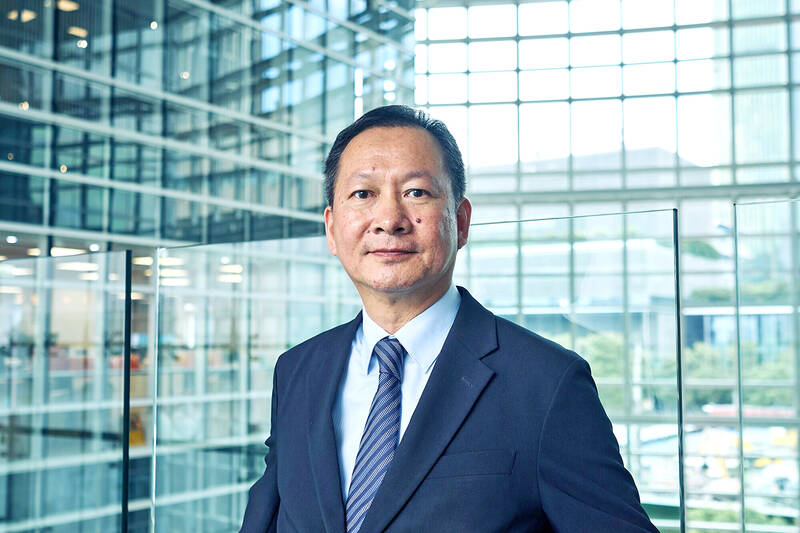Demand for artificial intelligence (AI) chips should spur growth for the semiconductor industry over the next few years, the CEO of a major supplier to Taiwan Semiconductor Manufacturing Co (TSMC, 台積電) said, dismissing concerns that investors had misjudged the pace and extent of spending on AI.
While the global chip market has grown about 8 percent annually over the past 20 years, AI semiconductors should grow at a much higher rate going forward, Scientech Corp (辛耘) chief executive officer Hsu Ming-chi (許明琪) told Bloomberg Television.
“This booming of the AI industry has just begun,” Hsu said. “For the most prominent company, the equipment we sold to them probably increased two to three times in a year.”

Photo: An Rong Xu, Bloomberg
DOUBTS
Hsu’s comments came after Nvidia Corp reported earnings that failed to meet investors’ loftiest expectations. Analysts also issued fresh warnings that AI’s promise of rewiring global economies is thus far unproven.
Nvidia’s shares tumbled 9.5 percent on Tuesday, wiping out US$278.9 billion in the biggest loss of value ever for a US stock. The stock edged 1.7 percent lower on Wednesday after a media report that it received a subpoena from the US Department of Justice, which the company denied.
Still, Hsu said he expected his company would see quarterly sales grow sequentially during the second half of the year, after second-quarter revenue increased 4.61 percent to NT$2.29 billion (US$71.4 million) from NT$2.19 billion the previous quarter.
SCIENTECH OPTIMISTIC
Hsu expressed his confidence in the launch of many AI applications in the future.
Taipei-based Scientech makes equipment used in TSMC’s exclusive packaging technology, called chip-on-wafer-on-substrate. That is in turn employed to make AI chips for the likes of Nvidia. Scientech’s net profit in the first half grew 45.5 percent to NT$436.19 million from a year earlier and its share price has gained 76.4 percent since the beginning of this year.

ADVANCED: Previously, Taiwanese chip companies were restricted from building overseas fabs with technology less than two generations behind domestic factories Taiwan Semiconductor Manufacturing Co (TSMC, 台積電), a major chip supplier to Nvidia Corp, would no longer be restricted from investing in next-generation 2-nanometer chip production in the US, the Ministry of Economic Affairs said yesterday. However, the ministry added that the world’s biggest contract chipmaker would not be making any reckless decisions, given the weight of its up to US$30 billion investment. To safeguard Taiwan’s chip technology advantages, the government has barred local chipmakers from making chips using more advanced technologies at their overseas factories, in China particularly. Chipmakers were previously only allowed to produce chips using less advanced technologies, specifically

BRAVE NEW WORLD: Nvidia believes that AI would fuel a new industrial revolution and would ‘do whatever we can’ to guide US AI policy, CEO Jensen Huang said Nvidia Corp cofounder and chief executive officer Jensen Huang (黃仁勳) on Tuesday said he is ready to meet US president-elect Donald Trump and offer his help to the incoming administration. “I’d be delighted to go see him and congratulate him, and do whatever we can to make this administration succeed,” Huang said in an interview with Bloomberg Television, adding that he has not been invited to visit Trump’s home base at Mar-a-Lago in Florida yet. As head of the world’s most valuable chipmaker, Huang has an opportunity to help steer the administration’s artificial intelligence (AI) policy at a moment of rapid change.

TARIFF SURGE: The strong performance could be attributed to the growing artificial intelligence device market and mass orders ahead of potential US tariffs, analysts said The combined revenue of companies listed on the Taiwan Stock Exchange and the Taipei Exchange for the whole of last year totaled NT$44.66 trillion (US$1.35 trillion), up 12.8 percent year-on-year and hit a record high, data compiled by investment consulting firm CMoney showed on Saturday. The result came after listed firms reported a 23.92 percent annual increase in combined revenue for last month at NT$4.1 trillion, the second-highest for the month of December on record, and posted a 15.63 percent rise in combined revenue for the December quarter at NT$12.25 billion, the highest quarterly figure ever, the data showed. Analysts attributed the

Taiwan Semiconductor Manufacturing Co’s (TSMC, 台積電) quarterly sales topped estimates, reinforcing investor hopes that the torrid pace of artificial intelligence (AI) hardware spending would extend into this year. The go-to chipmaker for Nvidia Corp and Apple Inc reported a 39 percent rise in December-quarter revenue to NT$868.5 billion (US$26.35 billion), based on calculations from monthly disclosures. That compared with an average estimate of NT$854.7 billion. The strong showing from Taiwan’s largest company bolsters expectations that big tech companies from Alphabet Inc to Microsoft Corp would continue to build and upgrade datacenters at a rapid clip to propel AI development. Growth accelerated for